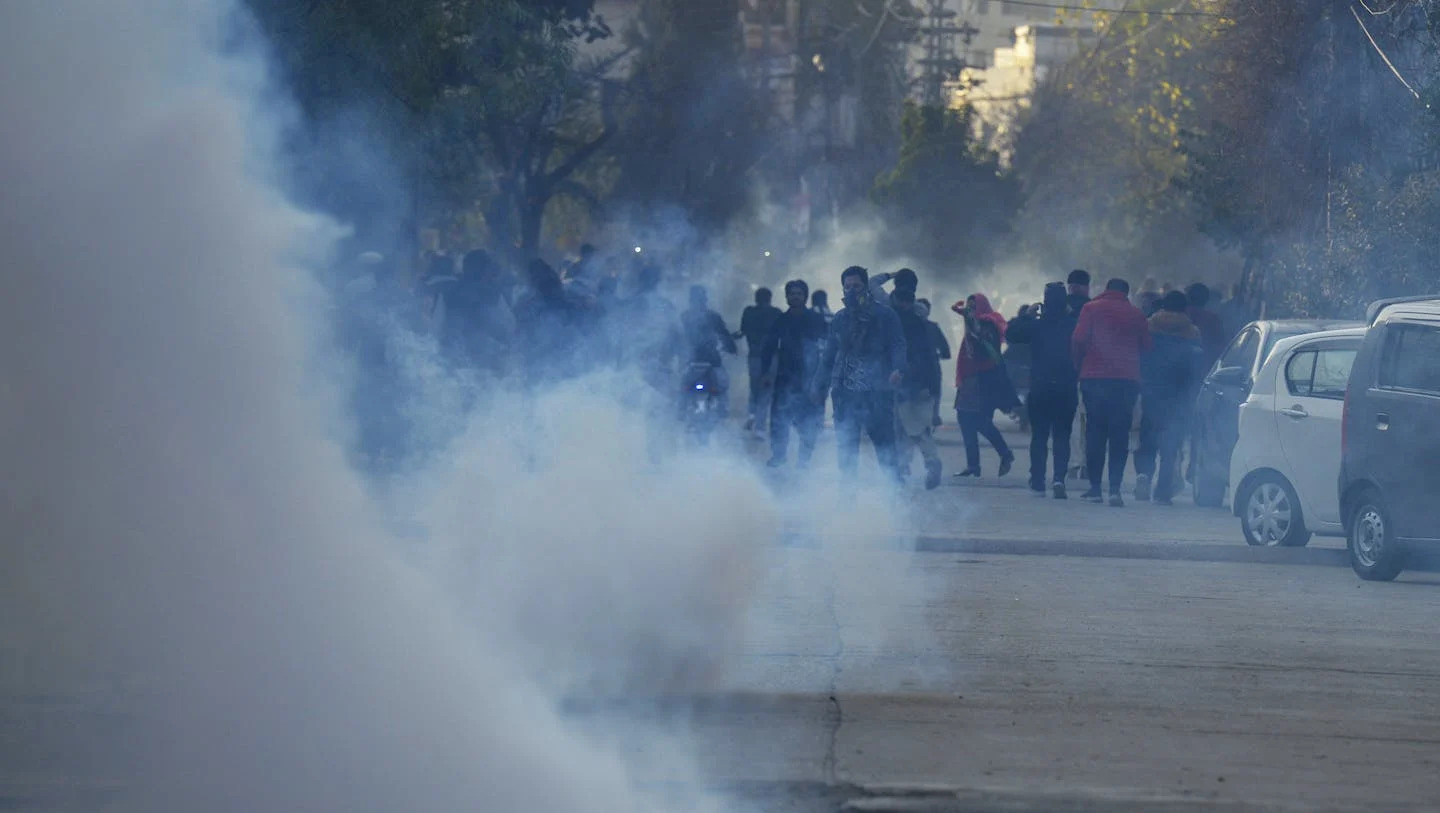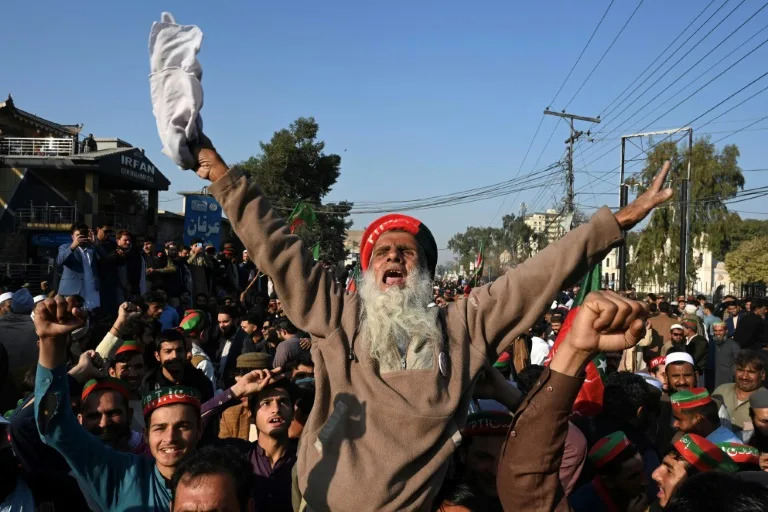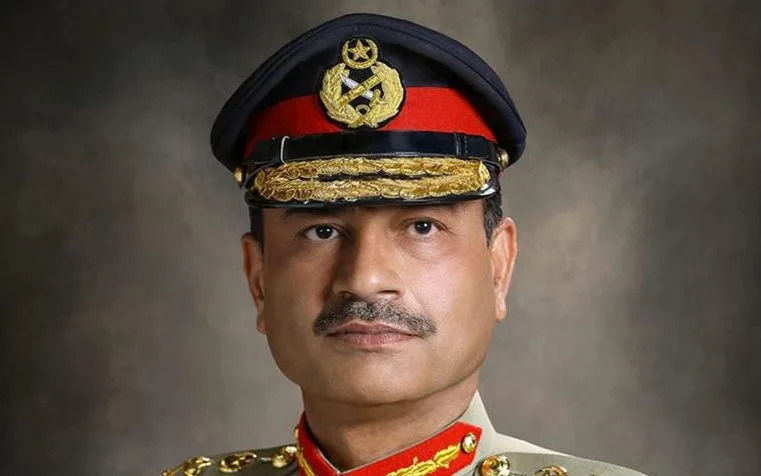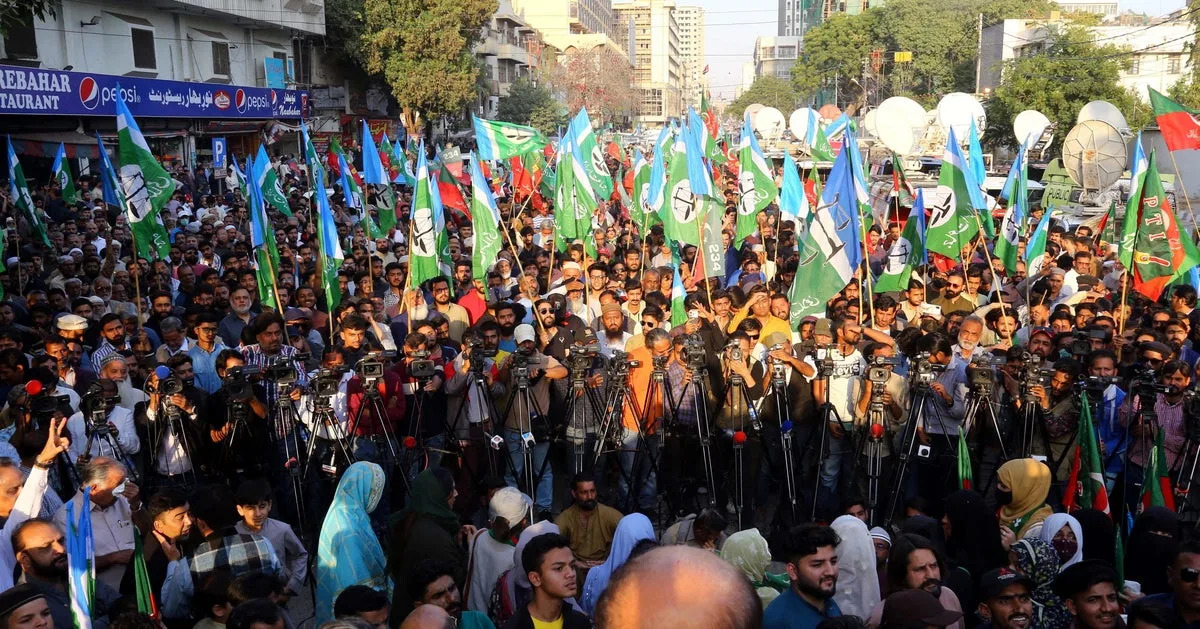Is it clear who will govern Pakistan next?
The results as they stand mean that no party is in a position to form a government on its own. So a coalition government at the federal level is unavoidable.
And this is where things get tricky. The Pakistan Tehreek-e-Insaf, or PTI – headed by jailed former prime minister and Pakistani cricket hero Imran Khan – has emerged as the largest party in the national assembly, with around 93 PTI candidates winning seats as “independents.” They had to run as independents because the party was barred from using its electoral symbol, a cricket bat, after a three-member bench of the supreme court ruled that PTI had failed to hold intraparty elections in line with its constitution.
Like at this pro-PTI protest, the smoke has yet to clear following Pakistan's election.
But with a total of 265 seats in parliament, that means the PTI is still well short of the number needed to form a government on its own.
The Pakistan Muslim League-Nawaz, or PMLN, came in second with 78 seats, a tally that is likely to be boosted by the addition of PMLN-aligned independent members of parliament. The party – headed by Shahbaz Sharif, who took over from Khan as prime minister in 2022, and his brother, former three-time prime minister Nawaz Sharif – is thought to have the backing of the powerful Pakistani army, but it did not perform as well as expected in the election.
The Pakistan People’s Party, or PPP, secured 54 seats, placing it third. It puts the party in a position to help another party form a coalition at the federal level.
With the most seats, is the PTI the front-runner to lead a coalition?
The PTI has made it clear that it wants to form a government on its own and believes that its mandate was stolen.
Even before the final election results became known, the PTI claimed it had won 170 or so seats – enough for it to be able to form a government. But that appears to be without evidence.
This suggests that the PTI isn’t ready to accept that they did not get enough votes to form a government outright. The party instead is challenging the results, claiming that its vote was suppressed illegally, and the PTI has already formally registered complaints in eighteen constituencies.
I believe it is more likely that a coalition will emerge between the other parties, led by the PMLN. But the question is whether that will satisfy an electorate that voted the PTI as the largest party in parliament.
That doesn’t sound very stable. Is it?
It isn’t. Pakistan is now entering an uncertain scenario, which is, in effect, a post-election political crisis.
Coalitions are not uncommon in Pakistan’s politics, but they are not easy to manage. They can become unwieldy, weak and prone to manipulation.
It also makes it far harder for any government to push through the kind of bold economic packages needed for the country to move forward and escape the deep structural problems that are ailing the economy, such as a limited tax base and reliance on handouts from other countries. Tackling that requires hard, potentially unpopular decisions, which are more difficult when a government is split and has a limited popular mandate.
The country may need a further reference to the voters in the shape of another national vote before too long to secure a more stable and workable government.
The election has been called flawed in the West. Is that fair?
By Pakistan’s standards, the actual polling went off relatively peacefully. There was a terrible attack in the restive province of Baluchistan on the eve of the election that killed 28 people. But fears of widespread violence on the day of the election did not materialize.
And while there were undue curbs on political activity in the run-up to the elections, the election itself appears to be largely credible by Pakistani standards, as the country’s foreign ministry has been quick to attest. The fact that the PTI, a party that is out of favor with Pakistan’s current senior military leadership, has done so well suggests that there was no straightforward rigging across the board. There was harassment of PTI voters in some places, but it clearly wasn’t sufficient to make huge inroads into their overall vote.
One can’t compare Pakistan’s democracy with that of the U.S. or any other country. The problem with many outside observers of Pakistan’s politics is that they talk normatively – that is, they see Pakistan’s elections through the eyes of what is generally seen as the norm elsewhere.
But Pakistani politics are unique. The country is a military-dominated state, with generals that have long been involved in the country’s politics – and elections.
But the alternative to managed elections, no matter how messy, is martial law. And a flawed democracy is better than the military jackboot.
More than that, the election itself took place relatively peacefully. There has been a great deal of criticism in the West about cellphones and mobile internet services being blocked on election day. That may seem like unacceptable interference in the electoral process to outside observers. But in Pakistan, there was real concern about cellphones being used to detonate explosive devices.
Will anyone be pleased with the election result?
Ironically, while the PTI’s strong showing represents an anti-establishment vote – and, more specifically, an anti-army vote – the divided national mandate means that the army high command has reason to be satisfied with the outcome.
A split national assembly and weak government plays into the military’s hands. Should the PMLN govern as the major party in a coalition, it will be in a position of relative weakness and will need the army’s support, especially if the PTI engages in widespread protests against the election results. It is already doing so as are the other parties with the exception of the PMLN but which has approached the courts to challenge election results.
Are there any positives from the election?
Yes insofar as the process of seeking the peoples’ support has been allowed to continue. But the negatives are seen by most to outweigh the positives and the 2024 elections are being viewed as equally if not more manipulated and controlled than the 2018 exercise. The turnout this time around is estimated to be around 48%, which is lower than in 2018 when it was 51%. The demographic breakdown is encouraging. The youth played a crucial role; 44% of voters are under the age of 35. And women, too, played an increased role in the vote – more women contested and also won seats.
And party politics aside, the result suggests that old tactics to intimidate and suppress voters largely didn’t work. The expectation was that the spate of legal verdicts against Imran Khan just weeks before the election and his continued imprisonment might curb his popularity and mean PTI supporters would stay home. That clearly didn’t happen.
But what they helped deliver may only help continue Pakistan’s political malaise as it heads into a new, uncertain period.
Pakistan police threaten crackdown after Khan party calls protests
Supporters of Pakistan Tehreek-e-Insaf (PTI) protest outside a temporary election commission office in Peshawar. PTI leaders claim they would have won even more seats if not for vote rigging.
Pakistan police warned Sunday they would come down hard on illegal gatherings after the party of jailed former prime minister Imran Khan urged supporters to protest alleged rigging in last week's election.
Independent candidates -- most linked to Khan's Pakistan Tehreek-e-Insaf (PTI) party -- took the most seats in the polls, scuppering the chances of the army-backed Pakistan Muslim League-Nawaz (PML-N) to win a ruling majority.
But independents can not form a government, and the country faces weeks of political uncertainty as rival parties negotiate possible coalitions.
PTI leaders claim they would have won even more seats if not for vote rigging.
A nationwide election-day mobile telephone blackout and the slow counting of results led to suspicions the military establishment was influencing the process to ensure success for the PML-N.
"Throughout Pakistan elections were manipulated in a subtle way," PTI chairman Gohar Ali Khan told a press conference Saturday, calling on supporters to "protest peacefully" on Sunday.
Authorities warned they would take strict action, saying so-called Section 144 orders were in place -- under a colonial-era law banning gatherings of two or more people.
"Some individuals are inciting illegal gatherings around the Election Commission and other government offices," said a statement Sunday from Islamabad's police force.
"Legal action will be taken against unlawful assemblies. It should be noted that soliciting for gatherings is also a crime."
A similar warning was also issued in Rawalpindi, while AFP correspondents saw dozens of police equipped with riot gear assembling near Liberty Market in Lahore.
Khan's party defied a months-long crackdown that crippled campaigning and forced candidates to run as independents to emerge as the winners of Thursday's vote.
Final results were announced Sunday, with independents winning 101 seats, PML-N 75, the Pakistan Peoples Party (PPP) 54, and the Muttahida Qaumi Movement (MQM) 17.
Ten minor parties mopped up the remaining 17 seats, with two remaining vacant.
"The results have clearly indicated that no single party possesses a simple majority to establish a government," said Zahid Hussain, a political analyst and author.
"The political future of the country from this point onward is highly uncertain."
Still, PTI leaders insist they have been given a "people's mandate" to form the next government.
"The people have decided in favour of Imran Khan," chairman Khan told Arab News in an interview.
A coalition between the PML-N and the PPP -- who formed the last government after ousting Khan with a no-confidence vote in April 2022 -- still seems the most likely outcome.
The country's military chief told feuding politicians to show "maturity and unity".
"The nation needs stable hands and a healing touch to move on from the politics of anarchy and polarisation which does not suit a progressive country of 250 million people," General Syed Asim Munir said in a statement released Saturday.
The military looms large over Pakistan's political landscape, with generals having run the country for nearly half its history since partition from India in 1947.
The military-backed PML-N, founded by three-time prime minister Nawaz Sharif, declared victory as the party with the largest number of seats, but to form a government he will be forced to cut deals with rivals and independents.
Khan was barred from contesting the election after being handed several lengthy prison sentences in the days leading up to the vote.
He was convicted earlier this month of treason, graft and having an un-Islamic marriage in three separate trials -- among nearly 200 cases brought against him since being ousted.
Pakistan army chief hails election success despite unrest and vote-rigging allegations
Gen. Asim Munir praised the successful conduct of Pakistan's bitterly contested elections.
Pakistan’s army chief praised the successful conduct of bitterly contested elections and called on politicians to show “maturity and unity” after the military’s favoured party failed to win a majority.
Party leaders began coalition horse-trading after a swell of support for jailed Imran Khan prevented the army-backed Pakistan Muslim League-Nawaz (PML-N) from winning.
With results still coming in, Mr Khan’s Pakistan Tehreek-e-Insaf (PTI) party continued to claim it had been cheated out of seats by systematic rigging.
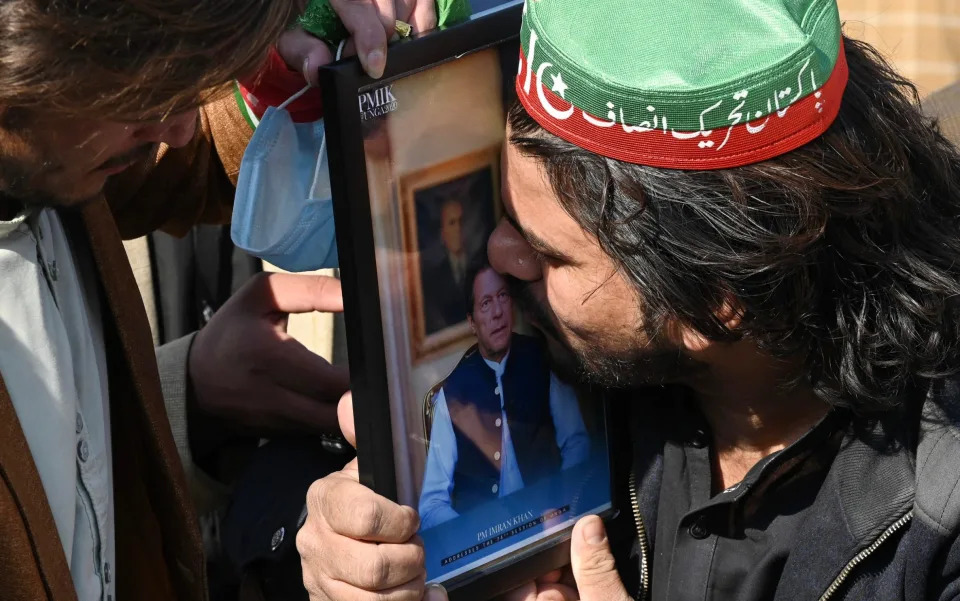
Britain, America and the European Union have all each expressed concerns about the conduct of the poll and urged a probe into reported irregularities.
The country now potentially faces weeks of further turmoil as alliances are thrashed out and results disputed in court.
The surprisingly strong showing for Mr Khan’s candidates, despite the former cricketer being in prison, is a sharp blow to the army, which had thrown its weight behind the PML-N’s Nawaz Sharif, analysts said.
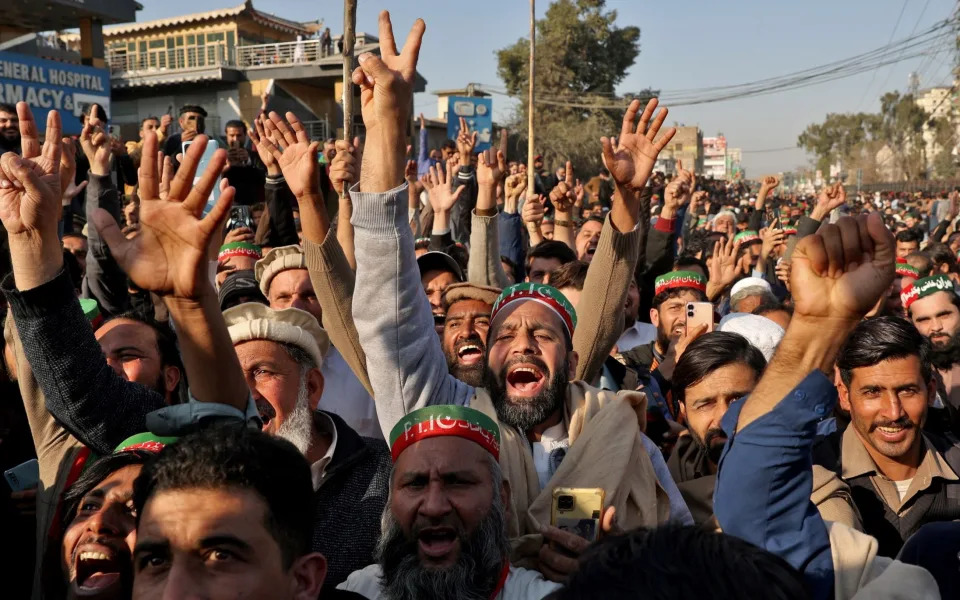
Gen Asim Munir, chief of the army staff, said: “Elections are not a zero-sum competition of winning and losing, but an exercise to determine the mandate of the people.
“As the people of Pakistan have reposed their combined trust in the constitution of Pakistan, it is now incumbent upon all political parties to reciprocate the same with political maturity and unity.
“The nation needs stable hands and a healing touch to move on from the politics of anarchy and polarisation, which does not suit a progressive country of 250 million people.”
A lengthy crackdown against Mr Khan’s party has put much of the leadership either in prison, or in hiding. Mr Khan has been jailed under an avalanche of criminal cases he says are politically motivated.
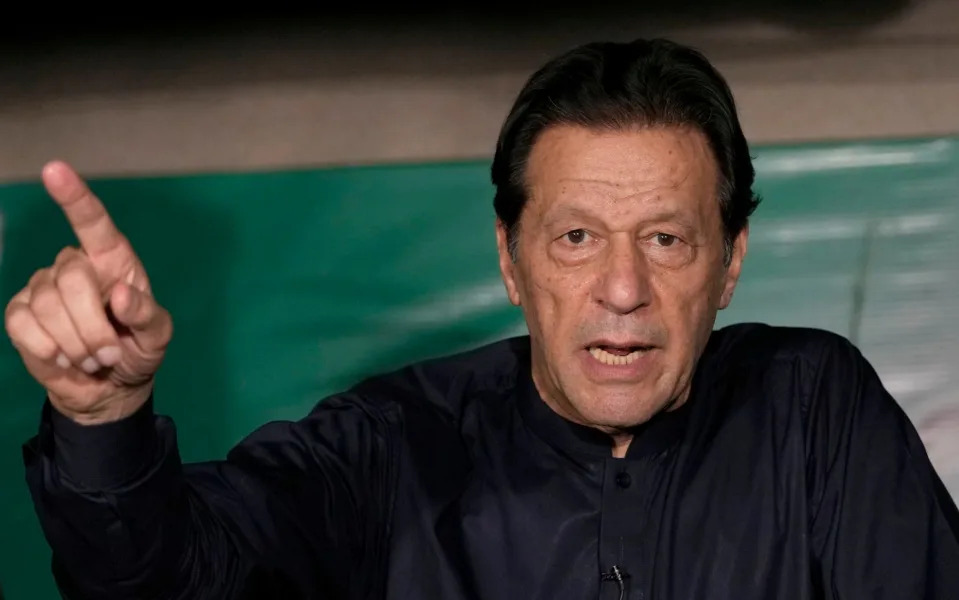
Meanwhile, his candidates have been harried and forced to run as independents, denying them the cricket bat polling symbol that made his party immediately recognisable to illiterate voters.
Yet despite such difficulties, by Saturday evening independent candidates had won 100 seats. All but a handful are thought to be loyal to Mr Khan. The PML-N had taken 71 seats and the Pakistan People’s Party had 54.
An editorial in Dawn, the country’s oldest English newspaper, concluded: “It seems the only thing the state was able to achieve through its persistent victimisation of the PTI was to turn it into a symbol of resistance for the people.”
A senior aide to Mr Khan on Saturday said the party would try to form a government. Mr Sharif has also said he will try to form a government.
Imran Khan-backed independents in lead as vote count concludes in Pakistan’s polls
Imran Khan-backed independents in lead as vote count concludes in Pakistan’s polls.
Vote counting in Pakistan’s general elections have officially concluded with Independent candidates, most of them backed by jailed former prime minister Imran Khan securing more than 100 of the 264 seats, according to the Election Commission.
The independent candidates, most of whom are linked to Mr Khan, won 101 seats, followed by former prime minister Nawaz Sharif’s party winning 75 seats which has become the single largest party in parliament.
The Pakistan People’s Party (PPP) has won 53 seats as vote counting concluded, the election commission’s website noted.
Three of the newly elected independents have announced their decision to join Mr Sharif’s Pakistan Muslim League-Nawaz (PML-N) party, according to the Express Tribune.
A party needs at least 133 seats for a simple majority.
Earlier on Saturday, Mr Khan called on supporters to peacefully protest the delay in announcing the poll results.
Pakistan’s election commission released the tally more than 60 hours after voting concluded in Thursday’s national elections.
It remains to be seen which party forms the government.
Both Mr Khan and Mr Sharif have claimed victory when vote counting was still underway on Saturday, leading to several world leaders raising concerns about Pakistan’s electoral process.
The US Department of State, the British foreign ministry, and the EU separately raised concerns and urged a probe into the reported irregularities in the election.
With Mr Khan jailed ahead of the election, the EU observed in a statement that there was a “lack of a level playing field” due to “the inability of some political actors to contest the elections”.
In an audio-visual message created using artificial intelligence, the jailed former prime minister called on his supporters to celebrate a win that was achieved despite what he calls a crackdown on his party.
In a premature victory speech, Mr Sharif also claimed to have won the election on Saturday.
With the candidates backed by Mr Khan competing without a party, a close aide of the former cricketer-turned-politician told Reuters that a new banner would be announced under which the independents may join.
“And we have no fear of independents going anywhere because these are the people who have struggled for the last 18 months and endured all kinds of torture and oppression,” Zulfi Bukhari said on Saturday.
Mr Sharif is also forming a coalition with PPP leader Bilawal Bhutto Zardari – the son of assassinated premier Benazir Bhutto, according to Geo TV.



